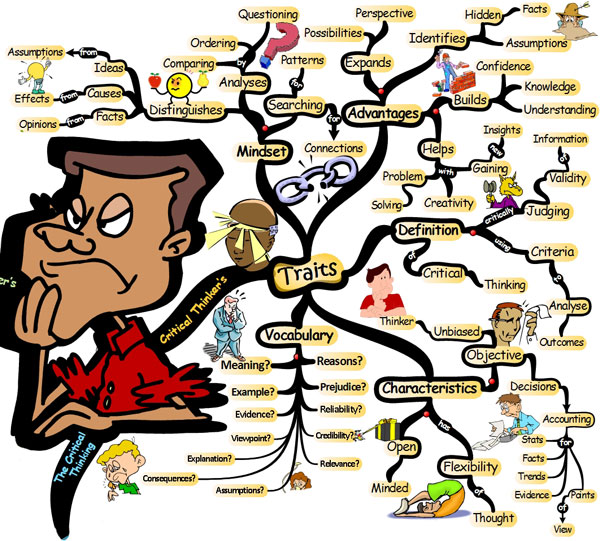
Using Critical Thinking Is Not The Same As Being Close-Minded
July 20, 2010

Using Critical Thinking Is Not The Same As Being Close-Minded
Many elementary school and high school students read this blog. Because of this reality, I would like to make a point that you might find helpful in thinking through your view of some things you read here. For our younger readers or those who have a gut reaction to the latest posting on Mr. Mike, please let me clarify a pivotal point. In examining evidence, including secondhand stories, there is a vast Grand Canyon of difference between using “critical thinking” skills and being “close-minded”/”open-minded.”
I’m afraid in a recent blog posting here at Cryptomundo, the writer has confused “close-mindedness” with “critical thinking.” Ms. Sharon Lee writes, regarding Mr. Mike, that she wants “you to open your mind and listen to a story.”
First off, what comes from Lan Lamphere, a known sensationalistic radio host is, she is correct, usually a “story,” indeed. Whether it is about Obama not having an American birth certificate, Lamphere’s version of the truth on 9/11, or reports from a clearly psychologically troubled individual like Mr. Mike seeing Bigfoot (a/k/a Ms. Lee’s “bigfoots”). As Ms. Lee notes, “Mr. Mike is being taken care of.”
“Opening one’s mind,” however, should never be translated into “believing.”

Ms. Lee appears to have confused “open-mindedness” with the total, uncritical acceptance of anything presented as having something to do with a sighting of a Bigfoot, as reported by Lan Lamphere as an alleged “capture” and/or “breaking news.”
After telling her story, Ms. Lee then says “You are now free to close your minds. Thank you for your time.”
To be “close-minded” means you are “not ready to receive new ideas.” Someone that fails to view a different point of view in a comparative fashion is closed minded. A close-minded individual believes in something or in someone without considering various sides of an issue or the evidence.
To be able to do some critical thinking is to have thoughts outside of the box. Critical thinking allows a person to attempt to understand both sides of an argument more fully, no matter which side they support. Thinking for yourself and having a clearer understanding of the main attributes for a variety of points of view are tenets of critical thinking.
Critical thinking involves determining the meaning and significance of what is observed or expressed, or, concerning a given inference or argument, determining whether there is adequate justification to accept the conclusion as true.
Critical thinking can more naturally be seen as the careful, deliberate determination of whether one should accept, reject, or suspend judgment about a claim and the degree of confidence with which one accepts or rejects it.
Critical thinking gives due consideration to the evidence, the context of judgment, the relevant criteria for making the judgment well, the applicable methods or techniques for forming the judgment, and the applicable theoretical constructs for understanding the problem and the question at hand. To practice critical thinking, one employs not only logic but broad intellectual criteria such as clarity, credibility, accuracy, precision, relevance, depth, breadth, significance and fairness. In contemporary usage “critical” has the connotation of expressing disapproval, which is not always true of critical thinking. A critical evaluation of an argument, for example, might conclude that it is valid. Thinking is often casual and informal, whereas critical thinking deliberately evaluates the quality of thinking.
Anyone that listens to Mr. Lamphere’s stories from Mr. Mike, which would be third-hand from Ms. Lee by the time they reach Cryptomundo, would do well to employ critical thinking.
To claim one has a “closed mind” when reading of the Mr. Mike stories is to incorrectly characterize the readers of Cryptomundo who routinely use good critical thinking skills, as we all should regarding cryptozoology.

Credit for chart: IQ Matrix.
About Loren Coleman
Loren Coleman is one of the world’s leading cryptozoologists, some say “the” leading living cryptozoologist. Certainly, he is acknowledged as the current living American researcher and writer who has most popularized cryptozoology in the late 20th and early 21st centuries.
Starting his fieldwork and investigations in 1960, after traveling and trekking extensively in pursuit of cryptozoological mysteries, Coleman began writing to share his experiences in 1969. An honorary member of Ivan T. Sanderson’s Society for the Investigation of the Unexplained in the 1970s, Coleman has been bestowed with similar honorary memberships of the North Idaho College Cryptozoology Club in 1983, and in subsequent years, that of the British Columbia Scientific Cryptozoology Club, CryptoSafari International, and other international organizations. He was also a Life Member and Benefactor of the International Society of Cryptozoology (now-defunct).
Loren Coleman’s daily blog, as a member of the Cryptomundo Team, served as an ongoing avenue of communication for the ever-growing body of cryptozoo news from 2005 through 2013. He returned as an infrequent contributor beginning Halloween week of 2015.
Coleman is the founder in 2003, and current director of the International Cryptozoology Museum in Portland, Maine.
Filed under Bigfoot, Conspiracies, Cryptomundo Exclusive, CryptoZoo News, Cryptozoology, Pop Culture, Public Forum, Reviews, Sasquatch, Skeptical Discussions